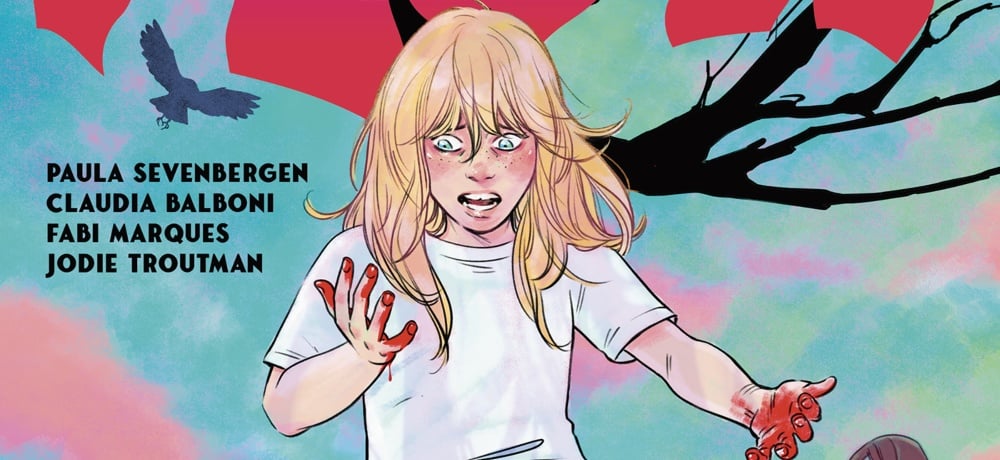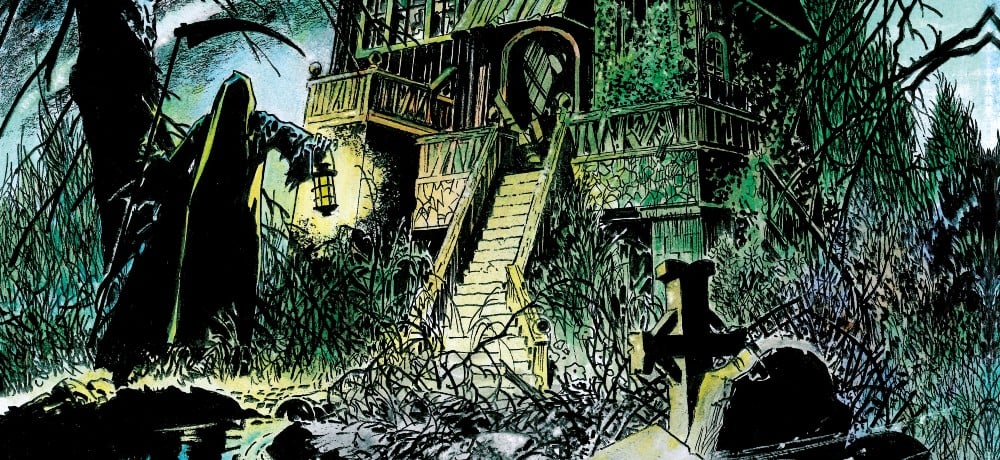





Evil has taken root in the residence of the Graham family in Hereditary, the stunning feature film directorial debut from Ari Aster that’s one-half supernatural spook show, one-half psychological horror, one hundred percent an exercise in nerve-shredding terror. Anchored by incredible performances from Toni Collette (who is working on a level here that is simply beyond any of us mere mortals), Alex Wolff, Gabriel Byrne, and Milly Shapiro, Hereditary is an intimately crafted domestic nightmare in which family ties are wound so tightly, the results are a violently unexpected descent into literal madness and blood-soaked mayhem.
At the start of Hereditary, the Graham family is bidding Annie’s (Collette) mother farewell after she passes away, but not everyone is grieving her death. Odd duck Charlie (Shapiro) misses her grandmother deeply (their unique bond is hinted at later on in the film, and man, is it ever disturbing), but the rest of her family isn’t nearly as bereaved as the 13-year-old. One day, Annie goes through some boxes of her mom’s stuff and comes across an ominous, yet weirdly optimistic, note telling her that the immense losses she must bear in the near future will lead to something far greater than Annie could ever imagine. Shrugging off the correspondence proves to be a grave mistake, as a tragic accident befalls the Graham clan, and things only get worse from there, especially for Annie, who is desperate to prove that her mother’s influence still looms over them, even after her demise.
Unable to communicate her feelings with her family, Annie finds herself compelled to join a grief support group, where she meets a woman named Joan (Ann Dowd), who lends her a sympathetic ear. One day, Joan, who recently lost her son and grandson, informs Annie that there’s still a way to keep in contact with those who have passed on, and that revelation spurs a new level of desperation in Collette’s character, effectively transforming Hereditary from a somewhat disturbing character study into a supernaturally-infused shocker in which no one is safe, including her well-meaning husband, Steve (Byrne), and stoic teenage son, Peter (Wolff).
Here’s the thing about Hereditary: the less you know going into it, the better, which is why I’ve been intentionally keeping this review slightly vague thus far. Aster, who also wrote the script for his feature-length debut, does a brilliant job subverting expectations with his masterful handling of several genre tropes in Hereditary. There are times where I was completely confident on just where the up-and-comer was taking his story, and the way he peels back the layers to reveal certain truths about these characters and the overall narrative is endlessly intriguing. I cannot wait to watch it again just to pick up on more details I undoubtedly missed on the first go-around.
At the same time, Aster has also crafted a powerfully emotional exploration of grief that admirably tackles the uglier side of parental conflicts. We’re drawn into the events of Hereditary via Annie, and yet she’s a complex protagonist who often makes us uncomfortable with her matter-of-factness towards loss and death, and she carries some heavy baggage when it comes to the strained relationships she shares with both her mother and her kids. There’s a moment where she admits to Joan that at one point, she nearly burned her children alive while sleepwalking, and we see through a dream sequence how she’s always struggled with being a mother, a role it seems like she very reluctantly accepted at first.
On a technical level, Hereditary is quite an accomplishment in a variety of ways. Annie’s profession involves constructing miniature dioramas, and cinematographer Pawel Pogorzelski utilizes the diminutive models in some rather clever ways, adding a little something extra to the overall themes that Aster incorporates into Hereditary. Pogorzelski also shows off a few more tricks with his camera throughout the film, and I loved the production design from Grace Yun, who transforms the Graham home from a warm and welcoming confine into Satan’s playground, with the muted palate beautifully reflecting something sinister simmering just below the surface.
While its mythology might be a bit more complicated than it really needs to be, Hereditary still manages to overcome a slight sense of convolutedness to deliver a mind-blowing wallop of an ending that’s on par with the likes of Carrie, Kill List, Possession, The Witch, or even Sleepaway Camp. I hope Aster enjoys a lengthy career working in the genre after Hereditary, as he exudes a rare sense of confidence with his very first time in the directorial seat for a feature film, and I’m very excited to see whatever he does next as a filmmaker.
Movie Score: 4.5/5
---------
In case you missed it, check here to catch up on our other live coverage of the 2018 Sundance Film Festival!